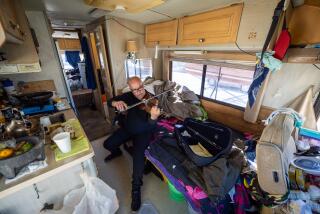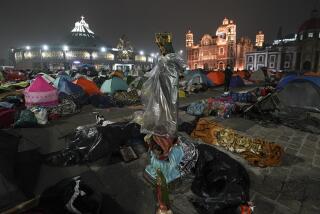Mariachis Sing Praises of Patron Saint
- Share via
In London, the day was being celebrated with a performance of the Britten Sinfonia at stately Stationers’ Hall.
In Boyle Heights, it was being observed by a group of enthusiastic mariachis playing guitars and trumpets on the street outside Olympic Donuts.
It was the annual Festival of St. Cecilia--which honors the patron saint of musicians. And London certainly had nothing on Friday’s street fiesta east of downtown Los Angeles.
The internationally celebrated day is important for mariachis who gather nightly outside the doughnut stand, hoping for work in Mexican restaurants and at private parties.
“Times are tough,” said one. “You have to be aggressive to find work.”
So more than a few private prayers asking St. Cecilia’s help were being offered as about 125 mariachis paraded through the streets of Boyle Heights and then celebrated Catholic Mass at a makeshift altar set up next to the doughnut stand.
Father Juan Santillan, pastor of Our Lady Help of Christians Church, said many mariachis are too busy hustling up work on Sunday mornings to attend Mass. “It’s hard for you to take confession,” he told the musicians. “So I want you to today.”
St. Cecilia, a 3rd century martyr who is said to have sung to God in her heart, has been taken seriously by musicians since the 16th century. Celebrated composers such as Purcell, Bach and Handel--whose “Ode for St. Cecilia’s Day” is considered by some his most beautiful work--have written symphonies in her honor.
And St. Cecilia’s Day is taken seriously by mariachis.
For three years they have joined at 1st Street and Boyle Avenue on Nov. 22 to play--and to pray. They have dubbed the street outside the doughnut stand as “Mariachi Plaza” and watched businesses with names such as Restaurant Santa Cecilia open nearby.
“If you come and sing to her, she’ll bring you good fortune,” said Victor Ramos Jr., a 28-year-old mariachi from Montebello. He stood in the street and played his violin next to his father, mariachi Victor Ramos Sr., 54, of East Los Angeles.
Musicians from dozens of competing mariachi bands played seamlessly together during the two-hour celebration. They performed such tunes as “Bajo el Cielo de Chihuahua” and “Las Mananitas” as they marched for several blocks through a residential area.
String instruments were in front, brass instruments were in the rear. And in the middle of the procession were Richard and Esperanza Mata, a husband-and-wife mariachi team from the Eastside.
They met playing mariachi music and married after Richard, a guitarist, lured Esperanza, a violinist, into his band, Voz de America. Esperanza was playing Friday as Richard pushed their 15-month-old daughter in a stroller. The child--named Angelica Cecilia after the couple’s patron saint--slept blissfully through the loud music.
Other mariachis ranging from 13-year-old Daniel Anda of Pico Rivera to 76-year-old Nicolas Castanet of East Los Angeles marched shoulder to shoulder along streets with names such as Michigan, Pennsylvania and New Jersey avenues. An appreciative crowd followed along on the sidewalk.
“There are some excellent players here,” said Alberto Aguilar, a retired laborer from East Los Angeles who bemoaned the fact that “I don’t play anything but chess.”
Inside Olympic Donuts, manager Michelle Pheng was enjoying the mariachis in a way she normally doesn’t get to.
“They’re here every night from about 6 to 10 and Saturdays and Sundays. You see 50 or 60 standing outside sometimes,” Pheng said. But some of them haven’t set foot in her shop for a while, she added.
“Right now they kind of have hard times. But when they make a lot of money, they spend a lot of money.”
Another spectator, children’s book author Alexandra Pollyea of West Los Angeles, laughed when told that St. Cecilia’s Day was a time of classical music concerts in Great Britain. She said the doughnut shop was perfect for a Los Angeles commemoration.
“If this were held at a place like the Music Center, it would take all the life out of this celebration,” Pollyea said.
“This is really true to the roots of what makes L.A. one of the most unique cities anywhere.”
More to Read
Sign up for Essential California
The most important California stories and recommendations in your inbox every morning.
You may occasionally receive promotional content from the Los Angeles Times.














